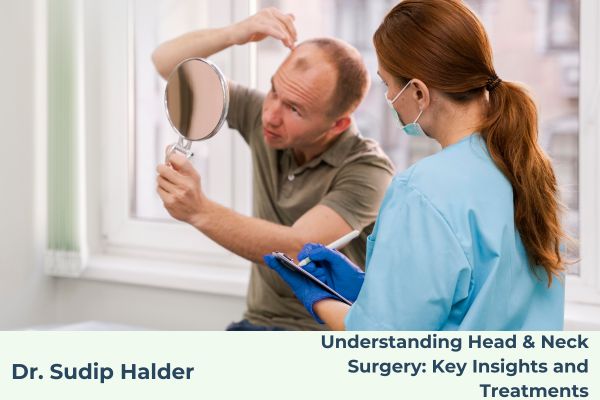Understanding Head & Neck Surgery: What You Need to Know with Dr. Sudip Haldar
Head & neck surgery is a specialized area of medicine that addresses a wide range of medical conditions affecting the head, neck, throat, and facial regions. These procedures can be life-saving, improving quality of life, and even restoring functionality after trauma or disease. In this blog, Dr. Sudip Haldar, an expert in head and neck surgery, provides a comprehensive guide on what this type of surgery involves, common conditions treated, and what you need to know before undergoing a procedure.
What is Head & Neck Surgery?
Head & neck surgery refers to surgical procedures aimed at treating disorders in the head, neck, throat, mouth, sinuses, larynx (voice box), thyroid gland, and lymph nodes. This branch of surgery involves specialists in otolaryngology, oncology, and plastic surgery who work together to manage diseases, cancers, infections, and deformities.
Common Conditions Treated by Head & Neck Surgery
- Head and Neck Cancer
One of the most common reasons for surgery in the head and neck region is cancer. This can include cancers of the mouth, throat, larynx, or thyroid. Early detection and intervention are crucial for a favorable outcome. Dr. Sudip Haldar specializes in treating head and neck cancers with advanced techniques, ensuring the best possible treatment options for patients. - Thyroid Disorders
Thyroid cancer or conditions like hyperthyroidism may require surgical treatment. Surgeons like Dr. Sudip Haldar perform procedures like thyroidectomy, which involves removing part or all of the thyroid gland, depending on the condition’s severity. - Sleep Apnea and Airway Obstructions
Obstructive sleep apnea is a common disorder that can disrupt sleep and overall health. Surgery may be needed to remove or reposition tissue in the airway to improve breathing during sleep. Dr. Sudip Haldar specializes in surgical options for sleep apnea that can help restore healthy breathing patterns. - Facial Trauma and Reconstruction
Injuries to the face or head, such as fractures or cuts, may require facial reconstructive surgery. Dr. Sudip Haldar has extensive experience in restoring functionality and aesthetics for patients who have experienced facial trauma or birth defects. - Infections and Cysts
Persistent infections or the development of cysts in the head and neck region may require surgery to prevent complications. Surgical removal or drainage of these infections is often necessary to avoid further health risks.
What to Expect Before, During, and After Surgery
Before Surgery:
Dr. Sudip Haldar emphasizes the importance of pre-surgical evaluations, which may include imaging tests, blood work, and a thorough medical history review. Proper preparation, such as fasting before surgery and managing other health conditions, will help ensure a smooth procedure.
During Surgery:
The type of surgery performed depends on the condition being treated. Some procedures may be minimally invasive, using endoscopic techniques to reduce recovery time and scarring. More extensive surgeries, such as those involving cancer or facial reconstruction, may require longer recovery periods. In most cases, general anesthesia is used to ensure comfort and safety throughout the surgery.
After Surgery:
Recovery will vary based on the complexity of the surgery. Dr. Sudip Haldar works closely with patients during the post-operative period to ensure proper healing. This may involve pain management, wound care, and follow-up visits to monitor progress. In some cases, rehabilitation might be necessary to regain full functionality.
Minimally Invasive Techniques in Head & Neck Surgery
With technological advancements, minimally invasive surgery has become more common in the treatment of head and neck conditions. Endoscopic techniques allow surgeons like Dr. Sudip Haldar to perform precise operations through small incisions, leading to quicker recovery times, reduced scarring, and less pain for patients.
Key Takeaways:
- Head and neck surgery addresses critical conditions affecting the head, neck, and throat.
- Conditions such as cancer, sleep apnea, and thyroid disorders are commonly treated with surgery.
- Minimally invasive techniques are changing the way surgeries are performed, offering better outcomes for patients.
- Always consult with a specialist like Dr. Sudip Haldar for the best treatment options and personalized care.
Head & neck surgery is a powerful tool in treating complex conditions that affect vital areas of the body. If you or a loved one is dealing with a condition that may require surgery, Dr. Sudip Haldar’s expertise can help guide you toward the right treatment for a better, healthier future.

